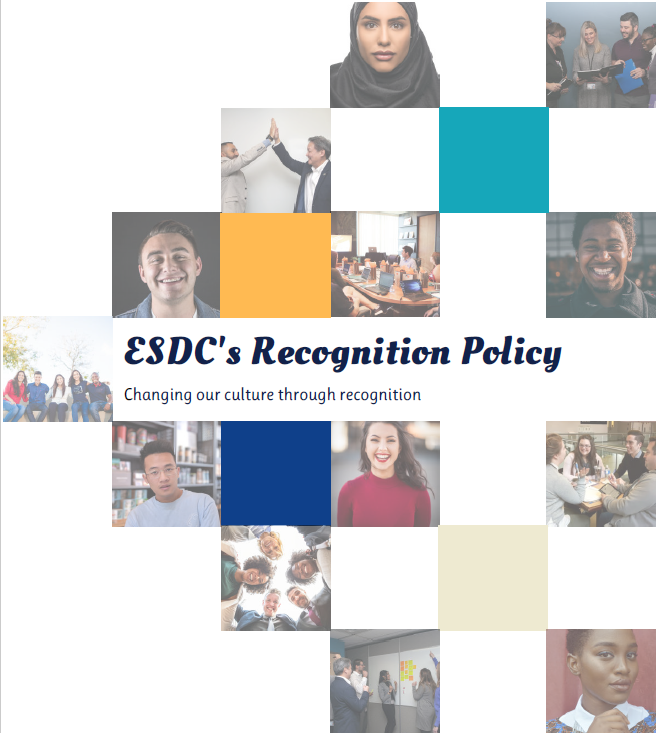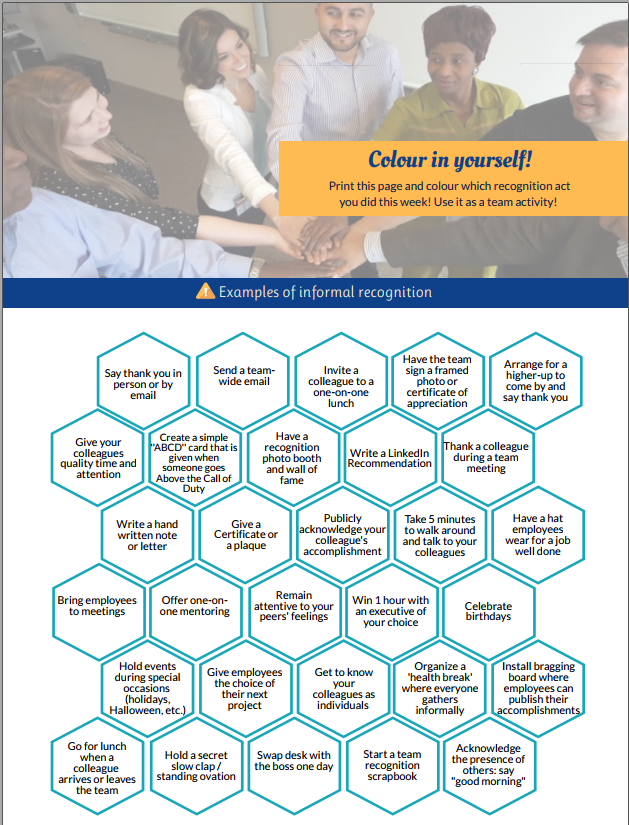ESDC Recognition Policy
Changing our culture through recognition

Effective Date: October 2019
National Engagement and Recognition Team
Human Resources Services Branch
Table of Contents
- Section 1
- Why should we express our recognition?
- Section 2
- The Recognition Program
- Five Principles of the Recognition Program
- Section 3
- Annex 1
- Financial Implications, Exceptions + Monitoring and Evaluation

Why should we express our recognition?
Recognition is not all about performance or meeting targets. You should also recognize efforts to improve or learn and good behaviours that contribute to a positive and healthy workplace.
Canadian Standards Association: Assembling the PiecesOur department's greatest asset and strength is our people. Recognizing the worth of our people is fundamental to a high-performing organization. Recognition makes employees:
- Feel valued, more motivated and productive
- More likely to remain with an organization
- Get a sense of ownership over their contributions to the organization
- Create a positive work environment
Did you know?
being listened to, supported and trusted.
The results of the 2019 Pulse Survey on Recognition also told us that employees value informal day-to- day recognition that is timely, simple and genuine.
The Recognition Program
The Recognition Program encourages all individuals at all levels of the Department to use a variety of informal and formal recognition activities to recognize the value of employees, and their efforts and contributions to the goals and health of the organization. Everyone playing an active role in recognition will help shape the culture of our Department, and create an environment where all employees have a sense of belonging, and that they are a part of ESDC's accomplishments.
Five Principles of the Recognition Program
1. Timely
Recognize accomplishments at the earliest opportunity. For the best impact, don't delay praise, don't wait for perfection, and don't wait until the project task is completed. Instead, think "team sports" and celebrate each win, not just the championship.
Note: This applies to informal recognition, but doesn't always apply to formal recognition.
Best practice:
To make the strongest impact, recognize efforts, achievements and successes, if not immediately, then within a few days.
Example of activity
During a team meeting, the manager can discuss how employees would like to be recognized. They can, for example, do a personality test to find the different types of personalities within the team. The way an introvert would like to be recognized may be different than an extrovert, for example.
2. Relevant
There is no one size fits all in recognition! What's meaningful to one employee compared to another can be significantly different. Choose a recognition method (formal or informal) that is appropriate to the scope of the success or the level of effort achieved.
Best practice:
Apply the platinum rule: "Treat others as they would like to be treated". Ask how the employee would like to be recognized.
3. Strategic
Strategically focus on: Contributions of employees that are aligned to the direction and priorities of the team, the Branch, the Region, the Department, and/or actions and decisions consistent with the values of the Department to highlight the thinking and behaviours you'd like to see more often.
Best practice:
Performance or meeting targets should not be the only thing that is celebrated. An individual who consistently meets all their targets but treats people badly can do great harm to a team's culture and collective performance.
4. Transparent
A successful recognition program is coherent and consistent. Be clear in your expectations and your plan to recognize employees and team, and then follow-through. Don't limit yourself to formal approaches. Informal recognition is just as valuable, if not more.
5. Specific
Give details of the achievement instead of handing out generic "thanks, good job!". Be specific as to what is it about the job that made it a "good job". The recognition should respect, among other things, the culture, interests, personality, wishes, and values of the employee.
Best practice:
When recognizing A person or a team, comment on the objective, observable things: What did the employee or team specifically do to make the job, action or behaviour something noteworthy, remarkable, significAnt, or to be celebrated?
How can we express our recognition?
Informal Recognition
Employees value daily recognition that is consistent and timely!
- Informal recognition is one of the ways we collectively shape our Department's environment to one where we feel and perform at our best
- It can take many forms
- It is easy and impactful
- It requires minimal planning and expenses
- It should be done on an ongoing basis
- It should be done by all employees towards employees at all levels
Expected results:
- Creates a positive and dynamic work environment where employees feel they can be heard, and that they are able to influence organizational decisions
- Influences self-identity, sense of belonging, self-confidence and motivates employees to improve their performance
Types of Informal Recognition
Existential Recognition
- Continuously acknowledge your colleagues as individuals
- Recognize the presence of others
- Should be practiced every day
Examples
- Greet your colleagues in the morning
- Check-in with your colleagues, ask how their day is going
- Do A walk around of the office to get to know your colleagues
Day-to-day Recognition
- Key practice
- Recognizing the hard work and dedication of others through simple and regular acts
Examples of Activities

Recognition Wall
Create a recognition wall where every two weeks or once a month you can celebrate an employee or team who made a difference in the workplace and post the employee's picture on the wall followed by an email.

Recognition Station
Create a recognition station with thank you notes so employees and colleagues can grab a note and easily thank, recognize and show appreciation to their peers.
Social Recognition
- Recognition through a digital platform used to share and celebrate accomplishments with others
- It provides public, continuous, and real-time recognition
- Good practice for virtual teams
- People-centric
The benefits of social recognition are:

- Empowering
- Gives space where new ideas and process improvements can be shared and recognized.

- Teamwork
- Fosters better peer-to-peer knowledge sharing and collaboration.

- Diverse
- Recognizes multiple employees for subject area expertise or a diverse range of skills.

- Culture-Shaping
- Strengthens the bond between the organization's culture and its people. When people praise colleagues for the successes and behaviours they experience each day in the workplace, it contributes to a positive working environment and reinforces exemplary behaviour and innovation.

- Reach
- Enables timely recognition to remote workers, across the Department.
Example of activity

Create an informal Facebook or GCconnex group with your team where every month an employee is celebrated for their accomplishments. It could also be a peer-to-peer recognition wall on Twitter or Facebook where employees recognize their colleagues.

long description
@bennny1po: Amazing work done by @ashleyyom in planning our directorate's #NationalPublicService week event. Your attention to detail is stellar!
@ashleyyom: Thanks Ben! I couldn't have done it without your support. #BestManagerEver
Instant Awards
- Form of material recognition
- For high-quality work that goes above and beyond the call of duty Informal
- flexible and timely
Did you know?
The iBoutique is a popular form of instant award.
Examples of Instant Awards via iBoutique
 Panasonic Wireless On-Ear Monitor Headphones
Panasonic Wireless On-Ear Monitor Headphones Persona Bluetooth Speaker
Persona Bluetooth Speaker Stainless Steel 500 ml Travel Tumbler Bundle
Stainless Steel 500 ml Travel Tumbler Bundle Colbat 61 cm Extra Large Sports Bag
Colbat 61 cm Extra Large Sports BagWhat management should know...
- Financial Authority:
-
Gift certificates and gift cards are considered near-cash items. Regardless of the cost they are considered a taxable benefit, be sure to consult the Canada Revenue Agency's rules for gifts and awards.
These gifts and awards are given at the discretion of the cost centre manager using the Recognition Program's – Approval Form (HRB5016) (PDF, 73 KB) (opens new window) which is to be sent to the Chief Financial Officer Branch (Corporate Accounting). They are funded from their respective salary budgets and must be applied under the salary fund (B001).
- Hospitality:
-
Hospitality requests cannot be used to reward work in the context of seasonal activities, or to purchase gifts for employees. As for Recognition Program ceremonies, they should be restricted to non-alcoholic beverages and light snacks, with approval in accordance with established procedures.
Best practice:
When choosing an award, remember to select an award that is appropriate to the scope of the success or the level of effort achieved. A minor recognition for a major accomplishment can be demotivating for employees.
Any individual can suggest the name of any employee within our department or team to their manager for an instant award. Instant Awards may be chosen from iBoutique or given as a gift certificate.
Note: Intoxicants and tobacco products, including gift certificates for same, are strictly prohibited.
Colour in yourself!
Print this page (PDF, 1.1 MB) and colour which recognition act you did this week! Use it as a team activity!
Long Description
Examples of informal recognition
- Say thank you in person or by email
- Send a team- wide email
- Invite a colleague to a one-on-one lunch
- Have the team sign a framed photo or certificate of appreciation
- Arrange for a higher-up to come by and say thank you
- Give your colleagues quality time and attention
- Create a simple "ABCD" card that is given when someone goes Above the Call of Duty
- Have a recognition photo booth and wall of fame
- Write a LinkedIn Recommendation
- Thank a colleague during a team meeting
- Write a hand-written note or letter
- Give a Certificate or a plaque
- Publicly acknowledge your colleague's accomplishment
- Take 5 minutes to walk around and talk to your colleagues
- Have a hat employees wear for a job well done
- Bring employees to meetings
- Offer one-on- one mentoring
- Remain attentive to your peers' feelings
- Win 1 hour with an executive of your choice
- Celebrate birthdays
- Hold events during special occasions (holidays, Halloween, etc.)
- Give employees the choice of their next project
- Get to know your colleagues as individuals
- Organize a "health break" where everyone gathers informally
- Install bragging board where employees can publish their accomplishments
- Go for lunch when a colleague arrives or leaves the team
- Hold a secret slow clap / standing ovation
- Swap desk with the boss one day
- Start a team recognition scrapbook
- Acknowledge the presence of others: say "good morning"
Formal Recognition
Formal Recognition in the Department is based on structured and scheduled activities and events. It is characterized by pre-established guidelines, and often results in an award. Competitive awards include a process for nomination, and assessment and are publicly awarded.
Deputy Ministers' Awards of Excellence
The Deputy Ministers' Awards of Excellence (DMAE) is the Department's most prestigious form of recognition held annually for work accomplished over the course of a fiscal year. It recognizes and rewards the dedication, determination and passion of employees who have performed above and beyond their regular duties to support the Department's priorities, business objectives and to recognize excellence along the policy, program and service continuum.
Eligibility for this award is limited to the Department's employees and teams. Consultants, external contractors, and employees from other governmental organizations (federal, provincial or municipal) are not eligible. Award recipients cannot be recognized more than once for the same initiative.
The nomination categories and criteria for these awards of excellence are revised and established annually by the Deputy Ministers and the National Engagement and Recognition Team. The Deputy Ministers approve the recipients of these awards.
The awards are presented by the Deputy Ministers at a formal ceremony usually held each year. For more information, visit the DMAE page on iService.
Assistant Deputy Minister Awards of Excellence
The ADM Awards of Excellence are the formal recognition at the Branch and Regional Level. They recognize the performance and achievements of employees that had an important impact on the achievement of the organization. ADM award recipients cannot be recognized more than once for the same initiative.
While the categories and criteria are not required to match those of the Deputy Ministers' Awards of Excellence, they must with the parameters of the Department's Recognition Program. The ADM approves the recipients, the type of award, and related costs.
External Awards
The Departmental Recognition Team coordinates the External Awards in which individuals and teams of the Department can participate to provide them with various opportunities to be recognized outside the Department in their areas of expertise.
While each external organization is responsible for establishing the award criteria, all nominations for external awards must initially be submitted to the Departmental Recognition Team. Submissions will be reviewed by the External Awards Committee who determines whether the nomination will be submitted.
Long Service Awards
Milestones of long service are recognized every five years, beginning at five years of service. All employees (term and indeterminate) are eligible for these awards if they have reached a recognized milestone while employed by the Department on their anniversary date. The following career milestones are recognized:
- 5 and 10 years of service: certificate signed by the ADM;
- 15 years of service and every 5 years: certificate signed by the Prime Minister, the Deputy Minister and a gift.
Gifts for a Long Service Awards (15 years or more) are funded from the budgets of the respective cost centre (CC) manager and must be chosen from the federally approved catalogue of items available at: www.seasons.ca
Notes:
- There Are financial implications for the recipient(s) of awards. Additional information is available in annex 1.
- A time limit of 12 months must be respected to avoid delays.
Retirement
All employees who retire while employed by the Department are formally recognized when they leave the Public Service after a minimum of ten years of service.
A certificate signed by the Prime Minister of Canada is awarded upon retirement.
Note: Requests for retirement recognition must be actioned within 12 months of the milestone date.
Annex 1
Financial Implications
All recognition activities must adhere to the Policy on the Delegation of Financial Signing Authorities an, d Specimen Signatures the Directive on Travel, Hospitality, Conference and Event Expenditures, and the Rules for Gifts and Awards .
All expenses related to recognition must go through the approval process using the Approval Form (HRB5016) (PDF, 73 KB) (opens new window) form.
For additional information on financial implications, please refer to the Canada Revenue Agency Policy on Gift and Awards and Gifts and awards outside (CRA) policy. The Department wishes to thank Environment Canada for allowing the use of the text below.
Instant Awards
To find out more about taxable and tax-exempt gifts and awards, be sure to consult Canada Revenue Agency Policy on Gift and Awards
National Public Service Week
Visit the National Public Service Week page on iService for more information.
Long Service Awards (Career Milestones)
Long Service Awards are subject to CRA's Policy for Gifts and Awards. As of January 1, 2010, a separate exemption applies for non-monetary Long Service Award valued at $500 or less, tax-free.
The award must be for a minimum of 15 years of service, and it has to be at least 5 years since the last Long Service Award, otherwise the award within 5-year period, only value of one award is tax exempt up to $500. Any amount over $500 is a taxable benefit.
Total Value
Use the fair market value (not the cost price), of each award, to calculate the total value of awards given in the year. The value of the GST/HST and shipping must be included.
The value of each non-monetary award given in recognition is tracked for each employee.
Special note about exemptions
An employer may give an employee a non-monetary Long Service Award worth up to $500 in the same year as other non- monetary tax-exempt instant awards worth up to $500 are given. In this case, there is no taxable benefit to the employee.
If the value of the Long Service Award is less than $500, the shortfall cannot be added to the annual $500 exemption for a Long Service Award.
Items of small or trivial value
Items of small or trivial value are not considered a taxable benefit. These items are not included when calculating the total value of awards given in the year in order to apply the exemptions.
Examples of small or trivial value include:
- Coffee or tea;
- T-shirts with employer's logos;
- Mugs;
- Plaques, certificates, or trophies.
Income Tax Implications
A taxable benefit is also pensionable. The employer must deduct Canada Pension Plan (CPP) contributions and income tax, which will be reflected on the employee's T4 slip.
Exceptions
- Intoxicants (alcohol, cannabis, etc.) and tobacco products are strictly prohibited as part of the Department's Code of Conduct and are not to be offered forms of recognition.
- All monetary awards are a taxable employment benefit. As per the Canada Revenue Agency, income tax associated to a cash award is deducted from the income. A T4 slip will be issued to recipients of near-cash awards.
- Employees participating in a performance pay (EX and EX minus 1) are not eligible to receive monetary awards and/or gift certificates as their compensation plan already contains a cash bonus component that recognizes their performance. They are, however, eligible to receive recognition with an item that has no monetary value.
Monitoring and Evaluation
The success of the Recognition Program will be monitored and evaluated using a variety of tools and activities, including, but not limited to surveys, quantitative data, and qualitative data.
Review/Renewal
This document will be reviewed every three (3) years, or earlier if required. Revisions will be presented to the Corporate Management Committee (CMC) for approval. Amendments to this document and annex require approval from the Assistant Deputy Minister of the Human Resources Services Branch.

